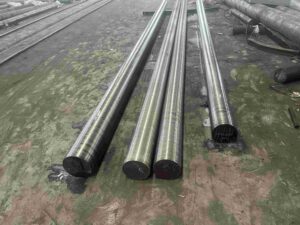9310 ALLOY STEEL AMS 6265 VAR UNS 93106
9310 VAR AMS 6265 is a Chromium-Nickel-Molybdenum Alloy used as a Carburizing Grade for Aircraft Parts. Users can obtain high case hardness coupled with high core strength and toughness. High alloy content makes it suitable for use in relatively large cross-sections. Its combination of high alloy and low carbon content can achieve high core hardness with a narrow range between thicker and thinner part cross sections.
This alloy can be used in some applications without case-hardening, as it exhibits strength with excellent toughness and ductility. Carburizing offers a highly wear-resistant surface. Service Steel Aerospace stocks Premium Aircraft Quality produced double melted in an Electric Furnace, followed by a VAR, or Vacuum Arc Remelt (also known as CEVM). Standard air-melted Aircraft Quality AMS 6260 Air Melt material is available on request. 9310 VIM-VAR material is also available on request.
<<9310 ALLOY STEEL AMS 6265 VAR UNS 93106 DATA SHEET>>
9310 VAR steel is typically used in the following applications:
Aircraft engine gears & pinions
Shafts
Clutch Parts
Boring bars
Piston pins
Aluminum rolling mill rolls
Common Trade Names:
Lescalloy 9310 Vac-Arc
European Designation 10NiCrMo13-5
9310 VAR
AISI 9310
SAE 9310
Common Specifications:
AMS 6265 VAR (CEVM)
AMS 6267 Type 2
AMS 2300 Cleanliness
AMS 6260 Air Melt Aircraft Quality (except VAR)
BPS 299-947-032
MIL-S-7393 Comp 3 (except VAR)
EMS 56729
EMS 56280
Chemical Composition:
| Symbol | Element | Min % | Max % |
| C | Carbon | 0.07% | 0.13% |
| Mn | Manganese | 0.40% | 0.70% |
| Si | Silicon | 0.15% | 0.35% |
| P | Phosphorus | 0.015% | |
| S | Sulfur | 0.015% | |
| Cr | Chromium | 1.00% | 1.40% |
| Ni | Nickel | 3.00% | 3.50% |
| Mo | Molybdenum | 0.08% | 0.15% |
| B | Boron | 0.001% (10 ppm) | |
| Cu | Copper | 0.035% |
Hardenability Requirements:
Jominy: J 1/16 inch: 41 RC Hardness max
Jominy: J 6/16 inch: 32 RC Hardness max
For Material Normalized 1700° F (927° C) with Test Specimen Annealed 1500° F (816° C)
Heat Treatment:
| Type | Process |
| Annealing | Heat throughout to 1475° – 1575° F, then furnace cool |
| Normalizing | Heat throughout to 1650° – 1750° F, then air cool |
| Carburizing & Hardening | Carburize at 1650° – 1700° F, slow cool. To harden, oil quench from 1425-1545 F |
| Temper | At 250° – 350° F |
| Approx Case Hardness | 60 – 62 HRC |
| Approx Core Hardness | 331 – 363 BHN |
Typical Core Properties after Pseudo-Carburizing:
| Heat Treatment | Tensile Strength | Yield Strength | Elongation in 2″ | Reduction of Area | Core Hardness |
| Pseudo Carburized 1700° F for 8 hours. Oil quenched, Tempered at 300° F for 2 hours | 187 ksi | 155 ksi | 15% | 51% | 375 Bhn |
| Pseudo Carburized 1700° F for 8 hours. Slow cool to room temperature. Heat to 1425° F, oil quench. Tempered at 300° F for 2 hours | 155 ksi | 130 ksi | 15.5% | 52% | 331 Bhn |
| Pseudo Carburized 1700° F for 8 hours. Slow cool to room temperature. Heat to 1525° F, oil quench. Tempered at 300° F for 2 hours | 175 ksi | 155 ksi | 16% | 53% | 363 Bhn |
Pseudo Carburized: Heat Treat with same process as for Carburizing, but without the presence of Carburizing Gas Furnace Atmosphere.

